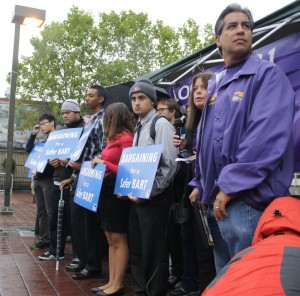Negotiations also have stalled over wages and employee pension and health care contributions.
“There has been some progress, very slow progress,” Almanza said. “But on the issues that really concern our members – safety, and, of course, benefits and pensions and wages – we’re nowhere near close to getting that resolved.”
BART officials have repeatedly called the safety issues raised by the unions a “smoke screen,” insisting contract negotiations are not the place to raise them. BART spokesman Rick Rice said the system can’t remain sustainable if employees continue to contribute nothing to pensions and pay a flat $92 per month for health care, regardless of the number of dependents. The gulf between each side's suggested wage increases over the next four years is vast, with the unions initially proposing 23 percent and BART proposing 4 percent.
“Safety is not part of the negotiations,” Rice said. “The district’s budget for 2014 has $4.5 million in the budget for new lighting in the tunnels. And frankly, union leaders have a chance to meet weekly and monthly to discuss issues like that.”
Rice said BART officials were back at the negotiating table today despite the strike authorization vote.
“It does seem a little selfish to threaten to put the Bay Area in chaos for a 23 percent pay increase, no pension contribution and very limited benefit contributions,” he said.
The unions disagree and filed a lawsuit in Alameda County Superior Court Monday asking the court to force BART to negotiate on worker safety. BART called in a state mediator to try to break the deadlock.
If the contracts expire Sunday at midnight without a deal, union bargaining teams are now authorized to call a strike, and Bay Area commuters are nervous. Tom Radulovich, president of the BART board of directors, asked Gov. Jerry Brown not to impose a 60-day cooling-off period, which would shift a potential work stoppage into a busier season.
“Just as crucially, the issues of pension and health care contributions, salary increases and work rules should be settled now and not postponed,” Radulovich wrote to Brown yesterday. “An unnecessary delay of 60 days would only put off hard choices that will have to be made in order to reach an agreement.”
A BART shutdown may be disastrous, warn transit officials. The Bay Area Metropolitan Transportation Commission is urging commuters to work from home or at least avoid rush hour, warning of “thousands more vehicles than usual” expected to clog streets and highways. The commission today approved $20 million in emergency funding to provide alternative transportation in the event of a BART strike. The money would come mostly from up to $18.7 million in state funding to BART that the MTC has the authority to redirect to other agencies if necessary, MTC executive director Steve Heminger said.
The commission will also be sending letters to employers in the region encouraging them to work with employees to find alternatives to driving during peak commute hours, MTC officials said. Telecommuting will be encouraged, as well as carpooling or using alternative transit services such as Alameda-Contra Costa Transit buses or ferries across the Bay.
BART provides about 400,000 rides daily, including 96,000 across the Bay in the Transbay Tube during peak commute hours, which is 50% more than when BART workers last held a strike in 1997, Heminger said.
Because of that, "the impact is likely to be even more substantial," Heminger said.
"The supplemental services ... can in no way fully replace BART's capacity in the event of a work stoppage," Heminger wrote in his request to the commission. "But these services can make a bad situation somewhat better for a considerable number of travelers."
In 2009, when BART workers voted to authorize a strike, contingency preparations were made before the strike was averted at the last minute.
“I think that there is a very legitimate fear that the city is going to be paralyzed,” San Francisco Supervisor David Campos said. “We rely heavily on the BART system. I am very worried about what it would mean for the city.” He said he was unaware of any city contingency plan should BART shut down.
Other transportation agencies are balking at trying to pick up BART’s slack. Members of ATU Local 192, representing AC Transit workers, also have authorized a strike for a contract set to expire Sunday.
ATU Local 192 President Yvonne Williams called absorbing BART’s 400,000 daily riders “probably impossible.”
“We carry close to 200,000 passengers a day,” she said. “We’re not equipped or able to absorb the additional 400,000 passengers a day, and we feel that would place our operators and the riding public in imminent danger.” Williams stopped short of saying AC Transit would strike if BART does.
Both sides in the BART negotiations are back at the bargaining table today. The unions have said they will give notice 72 hours before striking. Concerned commuters can sign up for strike alerts and learn more about BART’s position on the system’s website. SEIU 1021 and ATU 1555 also have information online.
Daly City resident Shenalya King, like many in the Bay Area, was distraught when she learned about the possible strike.
